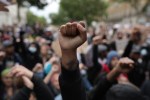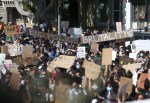“What should I do?” The question, uttered by Manuel (aka Manny) in Reinaldo Marcus Green’s Monsters and Men, felt almost too on the nose when I rewatched the film this past weekend. It’s a question many of us are wrestling with as we watch protests across the world decry systemic racism within police departments all over the United States. For Manny (played by Anthony Ramos in the film inspired by the killing of Eric Garner at the hands of police officers in New York City), the question centers on whether he should make public the video he caught on his phone of the incident that led to the death of Darius “Big D” Larson, a beloved black man in his Bed-Stuy neighborhood. But the question is arguably the central concern of Monsters and Men, which also focuses on a black cop (BlacKkKlansman‘s John David Washington) and a young baseball player (Waves‘s Kelvin Harrison Jr.), whose lives end up being affected by Manny’s eventual decision to release the video online.
Green’s film, which came out in 2018 and was inspired by events that took place in 2014, remains frustratingly timely — a reminder that little has changed in the last five years even as incidents like those depicted in the film have become needlessly and tirelessly common. Yet it’s animating narrative query is centered on what each of us are willing to risk in the name of fighting injustice. Green told Remezcla as much when his film first premiered at Sundance:
“These videos really started getting me thinking that this is an interesting way into the cyclical nature of these things. These are not isolated events: Eric Garner, Tamir Rice, Philando Castile, these things are happening all over the country, and vice versa, to the police officers who are being attacked because of these tapes. You have Brooklyn police officers, you have Baton Rouge; all over the country you see the backlash from the community because of these situations. My film kind of touches on all of these things, it’s about perspective. What do we do about it? Where do I put a stake in the ground?”
For Manny, the question of doing the right thing, of not letting the injustice of Big D’s death be ignored, is tied up with what he’s willing to give up. He has a young daughter and a partner to support; he addresses his “What should I do?” question at her, knowing that they’ll irrevocably be left to deal with the consequences. Green’s script doesn’t make Manny a martyr. Indeed, the film all but dispenses with him once he passes the narrative baton to Washington’s Dennis in the film’s triptych structure.

But his hesitation shows a real concern for how he’ll navigate what he knows is bound to happen: he’s falsely accused and taken in for questioning, clearly framed by NYPD cops looking out for their own. Exposing the police comes at great cost but Manny knows it’s the right thing to do. It was never going to be easy. Ally-ship never is, especially when you belong, as Manny does, to an equally targeted community that’s not immune from the brutality many U.S. institutions would rather not acknowledge.
“Cities are gonna keep burning,” his father tells him. “Kids are gonna keep getting shot. Cops are gonna keep getting off. I know it’s a reality.”
In Dennis’s (Washington) and Zyrick’s (Harrison Jr.) cases, the question of what they’re willing to let go is a much more complicated one. As a black cop, Dennis is keenly aware of the systemic problems in his department but knows that speaking out may cost him more than just his job. As his white cop partner tells him, having men on the force like the guy who shot Big D is the status quo, there’s little anyone can do. For Zyrick, deciding to become more of an activist in the wake of Big D’s death may cost him his ticket out, as his father puts it. “Cities are gonna keep burning,” his father tells him. “Kids are gonna keep getting shot. Cops are gonna keep getting off. I know it’s a reality.” But Zyrick’s chance at going pro is a way to escape his life in Bed-Stuy and better himself: attending protests that become violent may only put him more at risk.
All three men at the heart of Monsters and Men grapple with whether to put their own individual success above collective action. It’s a losing proposition, of course, designed by a system that all but depends on many people being left with choices that feel hopeless either way. Such a burden is necessary: the more you’re pushed to see whatever tentative privilege you have as contingent on keeping the status quo as is, the more likely you are to make choices that avoid dismantling that very system. Cross-racial solidarity and intersectional ally-ship, especially within the Latinx community, depends on realizing that such bargains are temporary at best and foolhardy at worst. But it doesn’t make those decisions any easier to resolve.

“What should I do?” The question is a difficult one and its answer may well make you uncomfortable. But at a historic moment in U.S. history, we must all look ourselves in the eye and frankly ask: What am I willing to give up? What will it take for me to speak up? What can I do to make sure men like Manny, Dennis and Zyrick don’t need to feel alone, surrounded and at times encouraged by a system of complicity and silence? Monsters and Men doesn’t offer tidy answers, but it may well be a necessary watch to help understand why the sadness and anger and frustration that’s running through the streets needs to feel overwhelming.
Monsters and Men is streaming on Hulu & available on VOD.




